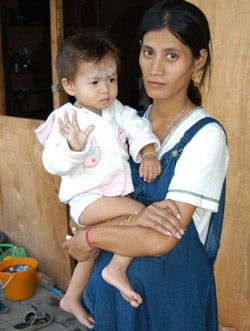Press Release
UNFPA Responds to Reproductive Health Needs in Rebuilt Communities and Among Migrants in Tsunami Region
24 February 2005
Press Release
24 February 2005
PHUKET, Thailand—Responding to critical needs in Thailand’s tsunami-affected communities, UNFPA, the United Nations Population Fund, is expanding its support for maternal and child health and family planning services and HIV prevention.

Working with Thai health authorities and NGO partners, UNFPA will offer training, research, supplies and equipment to ensure that newly built communities in four hard-hit provinces have adequate reproductive health information, counselling and services.
The Fund will also help the World Vision Foundation of Thailand to meet reproductive health needs in communities of migrant workers from neighboring Myanmar.
UNFPA has allocated emergency funds and is undertaking additional fund-raising to carry out these efforts.
In all of the countries hit by the 26 December tsunami, UNFPA is working to ensure that the special needs of women and youth are factored into the design and delivery of short- and medium-term humanitarian efforts. Its priorities are reproductive health, including safe childbirth, prevention of violence against women and girls, and psychosocial counselling.
The tsunami’s tragic debris has largely been cleared and ground has been broken for new communities in Ranong, Phang-nga, Phuket and Krabi. After a joint assessment, UNFPA and the Ministry of Public Health agreed assistance should focus on safe motherhood, family planning, gender equality, HIV prevention, and adolescent health including behaviour change communication.
Services will be provided through new and existing centres and mobile clinics. Medical staff, community health workers and volunteer educators, including youth, will be trained. Local people will participate in planning and evaluating the effort. Mahidol University will undertake social research to identify key needs.
A major share of the trauma along southern Thailand’s west coast was borne by migrant workers and their families from neighbouring Myanmar. These low-paid migrants play a vital role in commercial fishing and in the now booming construction industry. Their communities lack adequate health care and information, contributing to a high incidence of childhood diseases, tuberculosis and HIV/AIDS.
With support from UNFPA and other donors, World Vision has been providing health services and education in migrant settlements in Ranong, through mobile clinics and community volunteers. Plans to extend these efforts to Phuket were just getting under way when the tsunami struck. World Vision responded by providing emergency housing and water for displaced Thai and migrant families; UNFPA helped support this effort. In the next period, UNFPA plans to expand its migrant health project implemented by World Vision to cover Phang-nga, with an emphasis on reproductive health and HIV/AIDS prevention.
***
UNFPA is assisting governments and local populations in all the countries affected by the devastating earthquake and tsunami. To support the Fund's emergency response to the disaster or learn more, please visit www.unfpa.org.
Contact Information:
Thailand: William A. Ryan, tel. +662 288 2446, mobile +669 897 6984, ryanw@unfpa.org; Viennarat Chuangwiwat, tel. +662 288 1849; mobile +661 989 8866, viennarat@unfpa.un.or.th
New York: Omar Gharzeddine, tel. +1 212 297 5028, gharzeddine@unfpa.org